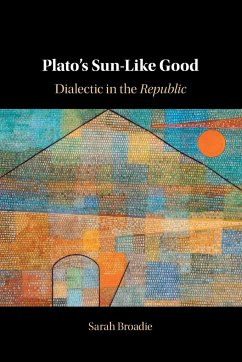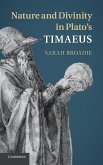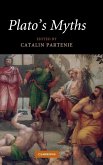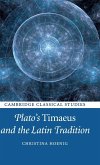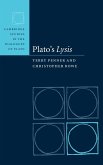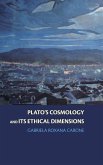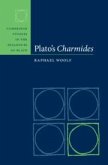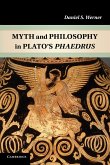Sarah Broadie
Plato's Sun-Like Good
Sarah Broadie
Plato's Sun-Like Good
- Broschiertes Buch
- Merkliste
- Auf die Merkliste
- Bewerten Bewerten
- Teilen
- Produkt teilen
- Produkterinnerung
- Produkterinnerung
An original and lucid discussion of the Republic's philosopher-rulers, their dialectic, and their relationship to the form of the good.
Andere Kunden interessierten sich auch für
![Nature and Divinity in Plato's Timaeus Nature and Divinity in Plato's Timaeus]() Sarah BroadieNature and Divinity in Plato's Timaeus99,99 €
Sarah BroadieNature and Divinity in Plato's Timaeus99,99 €![Plato's Myths Plato's Myths]() Plato's Myths95,99 €
Plato's Myths95,99 €![Plato's Timaeus and the Latin Tradition Plato's Timaeus and the Latin Tradition]() Christina HoenigPlato's Timaeus and the Latin Tradition96,99 €
Christina HoenigPlato's Timaeus and the Latin Tradition96,99 €![Plato's Lysis Plato's Lysis]() Terry PennerPlato's Lysis127,99 €
Terry PennerPlato's Lysis127,99 €![Plato's Cosmology and its Ethical Dimensions Plato's Cosmology and its Ethical Dimensions]() Gabriela Roxana CaronePlato's Cosmology and its Ethical Dimensions85,99 €
Gabriela Roxana CaronePlato's Cosmology and its Ethical Dimensions85,99 €![Plato's Charmides Plato's Charmides]() Raphael WoolfPlato's Charmides116,99 €
Raphael WoolfPlato's Charmides116,99 €![Myth and Philosophy in Plato's Phaedrus Myth and Philosophy in Plato's Phaedrus]() Daniel S. WernerMyth and Philosophy in Plato's Phaedrus50,99 €
Daniel S. WernerMyth and Philosophy in Plato's Phaedrus50,99 €-
-
-
An original and lucid discussion of the Republic's philosopher-rulers, their dialectic, and their relationship to the form of the good.
Hinweis: Dieser Artikel kann nur an eine deutsche Lieferadresse ausgeliefert werden.
Hinweis: Dieser Artikel kann nur an eine deutsche Lieferadresse ausgeliefert werden.
Produktdetails
- Produktdetails
- Verlag: Cambridge University Press
- Seitenzahl: 252
- Erscheinungstermin: 16. Februar 2023
- Englisch
- Abmessung: 229mm x 152mm x 14mm
- Gewicht: 371g
- ISBN-13: 9781009016407
- ISBN-10: 1009016407
- Artikelnr.: 66403923
- Herstellerkennzeichnung
- Libri GmbH
- Europaallee 1
- 36244 Bad Hersfeld
- gpsr@libri.de
- Verlag: Cambridge University Press
- Seitenzahl: 252
- Erscheinungstermin: 16. Februar 2023
- Englisch
- Abmessung: 229mm x 152mm x 14mm
- Gewicht: 371g
- ISBN-13: 9781009016407
- ISBN-10: 1009016407
- Artikelnr.: 66403923
- Herstellerkennzeichnung
- Libri GmbH
- Europaallee 1
- 36244 Bad Hersfeld
- gpsr@libri.de
Sarah Broadie is Bishop Wardlaw Professor of Philosophy at the University of St Andrews. She is author of Aristotle and Beyond: Essays on Metaphysics and Ethics (Cambridge University Press, 2007) and Nature and Divinity in Plato's Timaeus (Cambridge University Press, 2011), and editor of Aristotle's Nicomachean Ethics: A Philosophical Introduction and Commentary (2002). She has published dozens of book chapters and articles on Plato and Aristotle, and was awarded an OBE in 2019 for services to classical philosophy.
Part 1. Approaching the Sun-Good Analogy: 1.1 Introductory
1.2 The philosopher-rulers' intellectual task
1.3 'The most important thing to learn': Between plural and singular
1.4 What further knowledge does the longer way achieve?
Part 2. The Form of the Good and Knowledge: 2.1 Sun, cave, and sun again
2.2 Connecting sun and line
2.3 Higher and lower intellectual levels
2.4 Mathematical versus dialectical hypotheses
2.5 Saph¿neia
2.6 The form of the good as non-hypothetical principle
2.7 Dialectic and the good: Some questions
2.8 The role of the form of the good in dialectic
2.9 Some objections and replies
2.10 Textual counterevidence
2.11 The non-hypothetical principle as first premiss?
2.12 The form of the good as object of definition?
2.13 Dialectic and experience
2.14 Diagrams, dialectic, and context
2.15 Dialectic in government
2.16 Not rigorous enough?
2.17 Why is dialectic cognitively superior to mathematics?
2.18 Why are we shown so little about dialectic in the Republic?
2.19 True philosophers versus sight-lovers
2.20 Criteria and scope of 'good'
2.21 Main positions of Parts 1 and 2
Part 3. The Form of the Good and Being: 3.1 Preliminaries
3.2 First proposal
3.3 Interim discussion of 505a2-4
3.4 Second proposal
3.5 Perfectionist accounts
3.6 System accounts
Part 4. Various Further Questions: 4.1 Ambiguity of 'the good' (I)
4.2 Ambiguity of 'the good' (II)
4.3 Why the mathematical education?
4.4 Cosmology, theology
Part 5. Winding Up.
1.2 The philosopher-rulers' intellectual task
1.3 'The most important thing to learn': Between plural and singular
1.4 What further knowledge does the longer way achieve?
Part 2. The Form of the Good and Knowledge: 2.1 Sun, cave, and sun again
2.2 Connecting sun and line
2.3 Higher and lower intellectual levels
2.4 Mathematical versus dialectical hypotheses
2.5 Saph¿neia
2.6 The form of the good as non-hypothetical principle
2.7 Dialectic and the good: Some questions
2.8 The role of the form of the good in dialectic
2.9 Some objections and replies
2.10 Textual counterevidence
2.11 The non-hypothetical principle as first premiss?
2.12 The form of the good as object of definition?
2.13 Dialectic and experience
2.14 Diagrams, dialectic, and context
2.15 Dialectic in government
2.16 Not rigorous enough?
2.17 Why is dialectic cognitively superior to mathematics?
2.18 Why are we shown so little about dialectic in the Republic?
2.19 True philosophers versus sight-lovers
2.20 Criteria and scope of 'good'
2.21 Main positions of Parts 1 and 2
Part 3. The Form of the Good and Being: 3.1 Preliminaries
3.2 First proposal
3.3 Interim discussion of 505a2-4
3.4 Second proposal
3.5 Perfectionist accounts
3.6 System accounts
Part 4. Various Further Questions: 4.1 Ambiguity of 'the good' (I)
4.2 Ambiguity of 'the good' (II)
4.3 Why the mathematical education?
4.4 Cosmology, theology
Part 5. Winding Up.
Part 1. Approaching the Sun-Good Analogy: 1.1 Introductory
1.2 The philosopher-rulers' intellectual task
1.3 'The most important thing to learn': Between plural and singular
1.4 What further knowledge does the longer way achieve?
Part 2. The Form of the Good and Knowledge: 2.1 Sun, cave, and sun again
2.2 Connecting sun and line
2.3 Higher and lower intellectual levels
2.4 Mathematical versus dialectical hypotheses
2.5 Saph¿neia
2.6 The form of the good as non-hypothetical principle
2.7 Dialectic and the good: Some questions
2.8 The role of the form of the good in dialectic
2.9 Some objections and replies
2.10 Textual counterevidence
2.11 The non-hypothetical principle as first premiss?
2.12 The form of the good as object of definition?
2.13 Dialectic and experience
2.14 Diagrams, dialectic, and context
2.15 Dialectic in government
2.16 Not rigorous enough?
2.17 Why is dialectic cognitively superior to mathematics?
2.18 Why are we shown so little about dialectic in the Republic?
2.19 True philosophers versus sight-lovers
2.20 Criteria and scope of 'good'
2.21 Main positions of Parts 1 and 2
Part 3. The Form of the Good and Being: 3.1 Preliminaries
3.2 First proposal
3.3 Interim discussion of 505a2-4
3.4 Second proposal
3.5 Perfectionist accounts
3.6 System accounts
Part 4. Various Further Questions: 4.1 Ambiguity of 'the good' (I)
4.2 Ambiguity of 'the good' (II)
4.3 Why the mathematical education?
4.4 Cosmology, theology
Part 5. Winding Up.
1.2 The philosopher-rulers' intellectual task
1.3 'The most important thing to learn': Between plural and singular
1.4 What further knowledge does the longer way achieve?
Part 2. The Form of the Good and Knowledge: 2.1 Sun, cave, and sun again
2.2 Connecting sun and line
2.3 Higher and lower intellectual levels
2.4 Mathematical versus dialectical hypotheses
2.5 Saph¿neia
2.6 The form of the good as non-hypothetical principle
2.7 Dialectic and the good: Some questions
2.8 The role of the form of the good in dialectic
2.9 Some objections and replies
2.10 Textual counterevidence
2.11 The non-hypothetical principle as first premiss?
2.12 The form of the good as object of definition?
2.13 Dialectic and experience
2.14 Diagrams, dialectic, and context
2.15 Dialectic in government
2.16 Not rigorous enough?
2.17 Why is dialectic cognitively superior to mathematics?
2.18 Why are we shown so little about dialectic in the Republic?
2.19 True philosophers versus sight-lovers
2.20 Criteria and scope of 'good'
2.21 Main positions of Parts 1 and 2
Part 3. The Form of the Good and Being: 3.1 Preliminaries
3.2 First proposal
3.3 Interim discussion of 505a2-4
3.4 Second proposal
3.5 Perfectionist accounts
3.6 System accounts
Part 4. Various Further Questions: 4.1 Ambiguity of 'the good' (I)
4.2 Ambiguity of 'the good' (II)
4.3 Why the mathematical education?
4.4 Cosmology, theology
Part 5. Winding Up.

